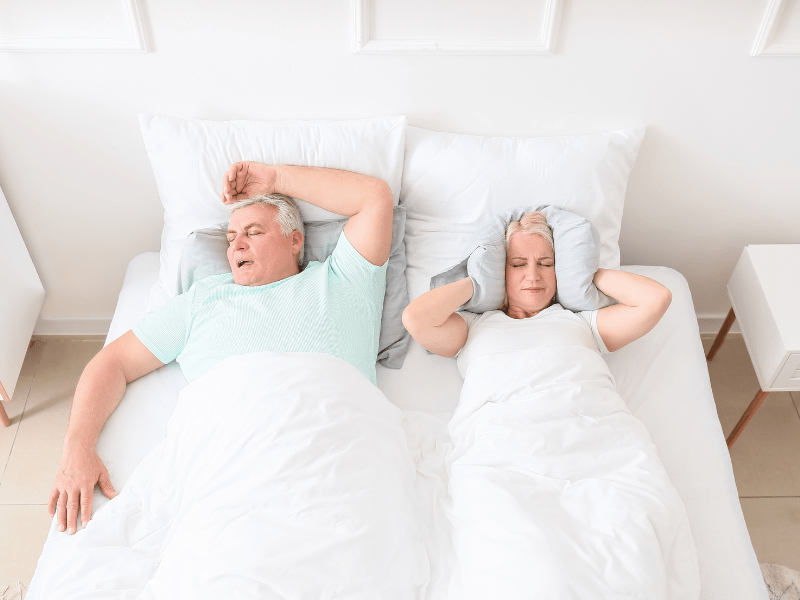Are you struggling with sleep disruptions and wonder if your screen time habits might be the culprit? Research reveals that two or more hours of evening screen time can interfere with our body's natural sleep preparations.
Our post today will delve into how technology affects your sleep quality and offer helpful strategies for better rest. Stay tuned, we promise it'll be a real eye-opener!
The Relationship Between Screen Time and Sleep Quality
Screen time before bedtime negatively affects both the duration and quality of sleep, primarily due to the impact of light-emitting screens on our circadian rhythm.
Screen time before bedtime
Using your cell phone or computer close to bedtime is bad for sleep. This screen time can change how you sleep. It can make it take longer to fall asleep. Too much screen time can also lead to less restful sleep.
You might feel tired during the day because of this disrupted sleep. Even kids and toddlers who use screens before bed may not get good sleep. Screens affect two important parts of sleeping: melatonin production and circadian rhythms, our body's natural clock.
Adverse effects on sleep time and quantity
Screen time cuts into sleep time. It's a fact. The more you use your phone or tablet before bed, the less sleep you get. This happens because screens keep you awake longer, making it harder to fall asleep once you stop using them.
Also, too much screen time changes your sleep patterns. It makes it so that when you do finally go to sleep, you don't stay asleep as long and wake up more often during the night. These broken nights of sleep can lead to feeling tired all day and not being able to focus on what needs doing.
Impact of light-emitting screens
Light-emitting screens hurt your sleep. Electronic devices like phones and TVs give off blue light. This light tricks your body. It makes your body think it's daytime when it's night. Your brain stops making melatonin, a sleep hormone. Screens make it harder to fall asleep and you feel less rested in the morning. Studies link bedtime screen use with poor sleep quality and more time needed to fall asleep.
So, too much screen time at night can lead to sleep problems like insomnia or other sleep disorders.
Mechanisms and Factors Affecting Sleep
Screen time before bedtime can disrupt sleep by displacing the time spent on actual sleep and providing psychological stimulation from media content, which can contribute to internet and video game addiction.
Time displacement of sleep
Excessive phone use can disrupt your sleep schedule, a phenomenon called time displacement of sleep. When you spend too much time on your smartphone or other screens, it can delay your bedtime and reduce the amount of time you spend sleeping.
This is because the stimulating content or addictive nature of technology keeps you engaged, making it difficult to wind down and go to bed at a reasonable hour. As a result, not only does this affect the quantity of your sleep but also its quality, leading to sleep deprivation and disturbances in your sleeping patterns.
It's important to recognize the negative impact of excessive screen time on your sleep and make changes to prioritize restful nights.
Psychological stimulation from media content
Media content can have a big impact on our minds, especially before bed. When we watch or interact with media like TV shows, movies, or video games, it can stimulate our brains and make it harder to fall asleep.
This is because these activities grab our attention and keep us engaged, making it difficult for our minds to relax and wind down for sleep. Studies have shown that excessive screen time before bed can lead to increased sleep problems and poorer sleep quality in both children and adolescents.
So, if you're having trouble sleeping, try reducing your exposure to stimulating media content before bedtime to help improve your sleep.
Internet and video game addiction
Excessive use of the internet and video games can lead to addiction, which can negatively impact sleep quality. Spending too much time online or playing video games can disrupt your sleep schedule, making it harder for you to fall asleep at night. This can result in delayed bedtimes and shorter total sleep time. Moreover, violent or exciting video games can increase heart rate and blood pressure, making it even more challenging to relax and unwind before bed.
It's essential to be aware of the addictive nature of technology and find a balance between leisure activities and getting enough restorative sleep.
Moderating factors
Moderating factors play a crucial role in the relationship between screen time and sleep quality. These factors can influence how screens affect our sleep patterns and overall well-being. Here are some important moderating factors to consider:
- Age: The impact of screens on sleep quality may vary depending on age. Young children and teenagers, for example, may be more susceptible to the negative effects of screen time on sleep.
- Content: The type of content viewed on screens before bedtime can affect sleep quality. Violent or stimulating content can increase psychological arousal and make it harder to fall asleep.
- Duration: The length of time spent using screens before bedtime is another moderating factor. Longer screen time is associated with poorer sleep outcomes, so it's important to limit screen use close to bedtime.
- Environment: The bedroom environment also plays a role in moderating the impact of screens on sleep. Creating an optimal sleep environment by removing electronic devices from the bedroom can improve overall sleep quality.
- Individual Differences: Each person may have unique sensitivities to screens and their effects on sleep. Some individuals may be more greatly impacted by screen time, while others may be less affected.
Tips for Improving Sleep While Using Technology
Set screen time limits to ensure you are not spending excessive hours in front of electronic devices, which can disrupt your sleep patterns.
Setting screen time limits
Screen time limits are important for improving sleep while using technology. Here are some tips for setting screen time limits:
- Determine a specific time limit for screen use before bedtime.
- Use smartphone apps or built- in features to set automatic timers or reminders for screen time.
- Encourage breaks from screens throughout the day to minimize overall usage.
- Create a schedule or routine that includes designated "screen-free" times, such as during meals or before bed.
- Establish clear rules and expectations about screen time with children and teenagers.
- Consider using parental control features to restrict screen time on devices.
- Keep electronic devices out of the bedroom to avoid temptation and reduce exposure to blue light before sleep.
Using technology in moderation
Using technology in moderation is a key factor in improving sleep while using electronic devices. Balancing the time spent on screens can greatly benefit your sleep quality. When we use technology too much, especially close to bedtime, it can disrupt our natural sleep patterns and make it harder to fall asleep.
By setting screen time limits and practicing moderation, you can create a better balance between device usage and healthy sleep patterns. It's important to remember that excessive device stimulation before bed can negatively impact your ability to get a good night's rest.
So, by incorporating technology in moderation into your bedtime routine, you can improve your overall sleep quality and promote better rest for yourself.
Creating optimal bedroom environment
To improve your sleep while using technology, it's important to create an optimal bedroom environment. Here are some tips:
- Keep your bedroom cool and comfortable. The ideal temperature for sleep is around 65 degrees Fahrenheit.
- Make sure your mattress and pillows provide proper support for your body.
- Use blackout curtains or an eye mask to block out any light that may disrupt your sleep.
- Keep the room quiet by using earplugs or a white noise machine if necessary.
- Remove any electronic devices from your bedroom or cover them with a cloth to avoid temptation and reduce exposure to blue light.
- Use a dim nightlight if needed, but make sure it doesn't emit blue light.
- Avoid having a cluttered bedroom, as it can cause stress and affect sleep quality.
- Keep your bedroom clean and free of allergens that could interfere with quality sleep.
Practicing good sleep hygiene
Practicing good sleep hygiene is essential for improving sleep quality. Here are some tips for mattress buyers to incorporate into their routine:
- Set a consistent sleep schedule by going to bed and waking up at the same time every day.
- Create a relaxing bedtime routine, such as reading a book or taking a warm bath, to signal to your body that it's time to sleep.
- Make sure your bedroom is dark, quiet, and cool. Consider using blackout curtains or a white noise machine if needed.
- Avoid consuming caffeine or eating heavy meals close to bedtime, as these can interfere with falling asleep.
- Limit your exposure to electronic devices before bed. The blue light emitted from screens can disrupt your sleep patterns.
- Keep electronic devices out of the bedroom or use features like night mode to reduce the amount of blue light emitted.
- Establish a technology-free zone in your bedroom to promote relaxation and better sleep.
Conclusion
In conclusion, excessive screen time before bed can have a negative impact on your sleep quality. It can disrupt the release of melatonin, making it harder to fall asleep and leading to daytime tiredness.
To improve your sleep, it's important to set limits on screen time, use technology in moderation, and create a bedroom environment that promotes good sleep hygiene. By being mindful of your technology use before bed, you can ensure better sleep and overall well-being.
FAQs
1. How does screen time before bed affect my sleep quality?
Screen time before bed can negatively affect your sleep quality by delaying the release of melatonin, a hormone that helps regulate sleep, making it harder to fall asleep and reducing the overall duration of your sleep.
2. Which screens should I avoid before bedtime?
It is recommended to avoid all screens before bedtime, including smartphones, tablets, computers, and televisions as they emit blue light which can disrupt your body's natural sleep-wake cycle.
3. Can using night mode or blue light filters on my devices help improve my sleep?
Using night mode or blue light filters on your devices can potentially reduce the impact of blue light exposure and improve your sleep quality. However, it is still best to limit screen time close to bedtime for optimal rest.
4. What activities can I do instead of using screens before bed?
Engaging in calming activities such as reading a book (preferably a physical one), taking a warm bath or shower, practicing relaxation techniques like deep breathing or meditation can promote better sleep without the adverse effects of screen time.
5. How long should I refrain from using screens before going to bed?
Experts suggest refraining from using screens at least 30 minutes to an hour before going to bed in order to give your body enough time to wind down and prepare for a restful sleep.






















